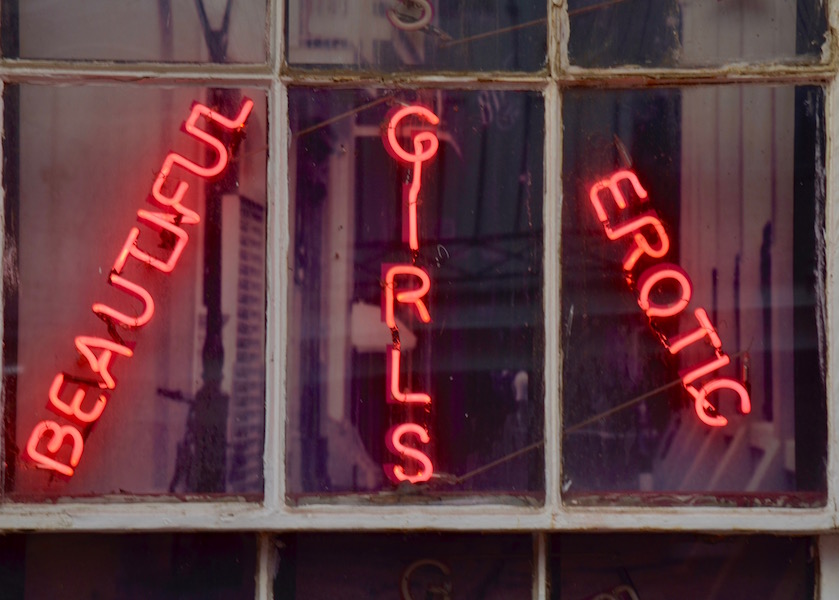Sex trafficking poses threat to community, students
Gwen Snyder | Senior Staff Photographer
A shop on Bourbon Street advertises strippers and professional dancers. Establishments like these have been linked to sex trafficking in the French Quarter.
Freshman Clare Maus grew up in a city but was still taken aback by the lively and unique nightlife in New Orleans.
She remembers that her first few times in the French Quarter left her astounded by the abundance of drunkards and tourists prowling the street. But what she said really made her feel far from home on Bourbon Street was a toxic sexual energy that filled the air.
“I mean especially with guys being super drunk, they kind of are even more willing to put their hands on you,” Maus said. “… So there definitely is that whole feeling of objectification for sure.”
New Orleans is known around the world for its high concentration of bars and clubs. What many may not be as familiar with is the illegal trafficking and manipulation that comes with some of these spaces.
“The increase in tourism to our city (demand), the saturation of strip clubs, the lack of enforcement of laws and the internet has made it easier for traffickers to prey on our most vulnerable: our children,” Sheri Lochridge, senior human trafficking case manager at the Covenant House, said.
Going to the clubs, paying cover fees and buying drinks allow these businesses to continue illegal activities.
As it is legally defined, human trafficking involves the use of force, fraud or coercion to obtain some type of labor or commercial sex act.
The problem with human trafficking in New Orleans is that it is closely aligned with an abundance of legal activity of sexually-oriented businesses in the city.
According to a Times-Picayune article, many clubs are conscious of the issue and are partaking in a legal business. According to the article, not all women who practice prostitution are under the jurisdiction of a pimp.
The Covenant House started to track sex trafficking cases in 2016, and according to the Times-Picayune, it provided services to 134 victims of sex trafficking, 17 of whom reported having sex with customers in French Quarter strip clubs.
Twenty-one year old Jamie* came to New Orleans from Lafayette and started working at Temptations Strip Club three years ago. Though her occupation as a stripper is not part of the sex trafficking industry, she has had close contact with people in the sex trafficking business.
“I mean there’s always gonna be pimps even if it’s legalized because they’re really good at manipulating women,” Jamie said. “But the main reason girls get into that is because they don’t know how to sell and don’t understand what being in a strip club is.”
Some find themselves engaging with the sex work industry for the economic benefits the trade has.
“A group of girls just wants extra money, and they think for a minute that there are some pretty high-end clubs on Bourbon Street – ‘Well, I’m just going to go make some money for school … I just want to go and make some money,'” Diane Amos, New Orleans Dream Center executive director, said.
According to Lochridge, traffickers are looking for many vulnerabilities as they search for possible victims. These include financial debt, mental health issues, unfamiliarity with the local community and substance abuse.
In an effort to uncover the illegal activity, the Louisiana Office of Alcohol and Tobacco Control sent undercover agents into bars and clubs on Bourbon Street in 2015. This mission is now known as “Operation Trick or Treat,” and as a result, nine bars and clubs in the French Quarter have been accused of illegal activity.
In Amos’ opinion, while the necessary laws are there, enforcement is lacking because it is easier for officers to arrest someone on a drug charge than it is to arrest individuals on charges of prostitution and trafficking. Amos, however, sees awareness and outreach as the most feasible solution to the problem.
“Education is key,” Amos said. “That’s why all of the students at Tulane need to know the issues surrounding human trafficking, how easy it is to get involved in it, what to do to protect themselves.”
On the other hand, Jamie advocates for job training for new strippers to help solve some of these problems. She says that even three days of job training would make a huge difference on an entertainer’s life path. It would both give them the confidence to perform and help ensure they are more aware of threats that could potentially put them in danger.
New Orleans is known for its vibrant and promiscuous environment. The presence of sex trafficking in New Orleans has been an issue for many years and may continue to grow.
“If your friends share experiences that sound like human trafficking, encourage them to come forward and give them your support,” Meredith Smith, Tulane Assistant Provost for Title IX and Clery Compliance, said. “It is never a person’s fault when someone else attempts to exploit or harm them.”
*The Hullabaloo has granted anonymity to a source in this article to prevent any potential harm. This subject has been given a pseudonym to protect their identity.
Your donation will support the student journalists of Tulane University. Your contribution will allow us to purchase equipment and cover our annual website hosting costs.



